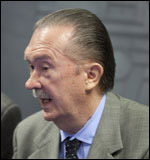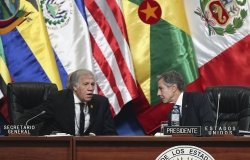Perspectives on Domestic Politics of the Incoming Government of President-Elect Dilma Rousseff
Speaker: David Fleischer, Professor Emeritus, University of BrasiliaDiscussants: Kellie Meiman, Managing Director, McLarty Associates; Bryan McCann, Professor, Georgetown University Moderator: Paulo Sotero, Director, Brazil Institute, Woodrow Wilson Center
Overview
Dilma Rousseff, the first woman to govern Brazil, will enter office with the support of a political alliance of 10 parties that will control 60 percent of the seats in both houses of Congress. However, managing such a complex political alliance will be a difficult task for Rousseff, according to panel discussion at the Wilson Center. Brazil Institute Director Paulo Sotero underlined the president elect's challenge in that regard by pointing to an early effort led by the PMDB, the main partner of Rousseff's Workers Party, to form a blocão (a big block) within the presidential coalition to demand more political spoils.
Noted Brazil scholar David Fleischer, of the University of Brasília, reviewed the results of the October 31 election, highlighting the regional differences in support for the presidential candidates: Rousseff was heavily favored in the poorer areas of the north and northeast, while rival José Serra won in the wealthier areas of the south and southeast. Fleischer underscored the comfortable (over 60 percent) majorities Rousseff has in both houses of Congress– larger than her predecessor ever enjoyed. This is mostly due to extensive campaigning efforts by Lula for congressional candidates. The downside of this large governing majority is that it will, in some ways, make forming and managing a government more difficulty, observed Fleischer, as more and more parties and political figures will expect political goods such as committee assignments, ministries, and other allocations in return for their support of Lula and Rousseff.
of the October 31 election, highlighting the regional differences in support for the presidential candidates: Rousseff was heavily favored in the poorer areas of the north and northeast, while rival José Serra won in the wealthier areas of the south and southeast. Fleischer underscored the comfortable (over 60 percent) majorities Rousseff has in both houses of Congress– larger than her predecessor ever enjoyed. This is mostly due to extensive campaigning efforts by Lula for congressional candidates. The downside of this large governing majority is that it will, in some ways, make forming and managing a government more difficulty, observed Fleischer, as more and more parties and political figures will expect political goods such as committee assignments, ministries, and other allocations in return for their support of Lula and Rousseff.
As expected, Rousseff's transition team consists largely of major PT figures whose short-term objectives will be to articulate the party coalition. The team will filter nominations for various posts, and control earmarks that many members of the governing coalition will see as their rightful spoils for being loyal to the coalition, according to Fleischer. He then offered some speculation on possible names, predicting that many, if not most, nominations would be major figures already in the government. Among them are Antônio Palocci, who will most likely be chief of staff, and Guido Mantega, current finance minister, who has expressed his interest in remaining in his post. Another factor that will bear on Rousseff's selections is her promise to have women ministers in one third of her ministry, which would be an enormous increase compared to the current government, where only three of the 34 ministers are women.
According to Fleischer, among the challenges Brazil and the Rousseff administration will need to tackle in 2011 include massive infrastructure investment; political, tax, and pension reform, which has a glimmer of a possibility, since there will be no election recess in 2011; federal-state relations; controlling government expenditures despite enormous pressure to increase them; eradicating misery and poverty; regulating the pre-salt petroleum to avoid the commodities curse; handling the global currency exchange war; and finally, developing industrial policy for key sectors of the economy (in which Luciano Coutinho, current head of the BNDES, will most likely be a major player).
Kellie Meiman, managing director of McLarty Associates, emphasized the immediacy of the task of managing priorities, seeing as how Rousseff will only be able to tackle but so many of the above challenges in her first year. In this process of deciding her agenda, Meiman noted that the president will need to balance out four competing interests: the governing coalition, state governors, Brazil's needs, and public demands. The public has made it very clear that the average Brazilian wants a continuation of Lula's policies, more specifically, sustaining economic growth, managing infrastructure investments (possibly through a rumored new position of super-minister of infrastructure) and deepening social policy. She observed that Rousseff inherited a positive situation, but it will become increasingly difficult to balance out economic and social goals. How can she continue to invest heavily while reigning in government spending to reduce Brazil's enormously high interest rates? Furthermore, Rousseff must keep an eye on political necessities, Meiman said, such as branding new infrastructure so that she gets credit for it– continuing her image as the "mãe do PAC" ["mother" of the Program to Accelerate Growth, which she led under Lula]. Such political concerns will also force her to narrow her agenda, meaning other important issues, such as foreign policy and education, will probably take the back burner, Meiman predicted.
Bryan McCann, a historian of Brazil and professor at Georgetown University, agreed that managing her own coalition will be Rousseff's greatest challenge. In particular, he stressed that the unique, amoeba-like structure of the PMDB makes the situation tricky to control. The PMDB consists of important regional figures, who wield a large amount of influence, but its lack of a dominate ideology or major national figure means that it must always be allied to another party. A prime example is the PMDB governor of the state of Rio de Janeiro, who loyally backed Rousseff during the elections and is now demanding a greater percentage of the revenues from the pre-salt oil development– which may also indicate future challenges of allocating oil income. This incident and the election of Tiririca, a professional television clown who received the largest number of votes of any federal deputy, help underscore the need for political reform, and the growing popular frustration with politics, despite Lula's stratospheric approval ratings, McCann concluded.
By J.C. Hodges
Paulo Sotero, Brazil Institute
Documents & Downloads
- Perspectives on Domestic Politics of the Incoming Government of President-Elect Dilma RousseffDownload
- Perspectives on Domestic Politics of the Incoming Government of President-Elect Dilma RousseffDownload
- Perspectives on Domestic Politics of the Incoming Government of President-Elect Dilma RousseffDownload
- Perspectives on Domestic Politics of the Incoming Government of President-Elect Dilma RousseffDownload
Speakers
Hosted By

Brazil Institute
The Brazil Institute—the only country-specific policy institution focused on Brazil in Washington—works to foster understanding of Brazil’s complex reality and to support more consequential relations between Brazilian and US institutions in all sectors. The Brazil Institute plays this role by producing independent research and programs that bridge the gap between scholarship and policy, and by serving as a crossroads for leading policymakers, scholars and private sector representatives who are committed to addressing Brazil’s challenges and opportunities. Read more
Thank you for your interest in this event. Please send any feedback or questions to our Events staff.












